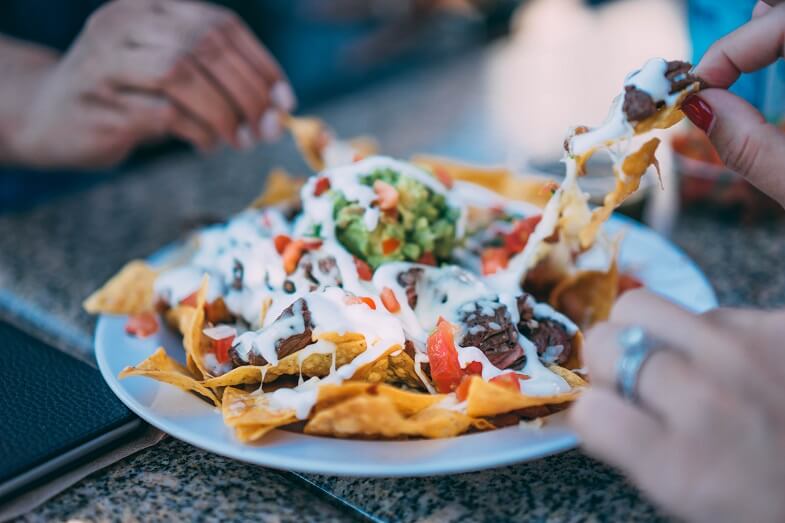Everyone enjoys a nice plate of food – but only when the food is good and the time is right. Sometimes, we get offered food that we do not want.

Unfortunately, in several scenarios, not accepting food might be perceived as rude and disrespectful.
So, what should you do?
Is it rude to not accept food? It depends: You’ll be at fault when you are rejecting food for the wrong reasons, like personal bias, or when a misunderstanding takes place due to cultural differences.
Your safest bet is to take whatever you’re being offered to avoid coming off as a rude person, but you’re free to reject anything due to allergies or previous bad experiences.
In those scenarios, you should always explain why you’re not accepting food. If you decide to reject the food, you need to make it clear that the issue is about you and not anyone else.
When is it rude to not accept food?
Personal bias
If you are rejecting something because you have never eaten it before, people might find it rude, especially if you are refusing to eat ethnic food.
You are not only refusing to eat something; you’re refusing a piece of a foreign culture on personal bias. This is both rude and disrespectful.
That is not to say you must accept ethnic food all the time. You can say you don’t fancy it or it’s not appealing to you. What you cannot do is refuse food because it comes from a different country or different people.
Simple gestures
Sometimes, food is not about eating but about sharing a moment.
If, for example, someone is bringing food to work and wants to share it with everyone, he or she isn’t trying to get you to eat something. Instead, that person is trying to bond with everyone via food – something that has been done since the dawn of time.
When it comes to simple gestures, it’s always best to accept them. If these things happen all the time (for example, a busy birthday season at work with a lot of cakes coming and going), you should feel free to accept a piece of cake and refuse others.
But don’t be the guy who is always refusing cake, it’s a way to distance yourself from the social group – and that’s rude.
Courtesy
When someone offers you something out of courtesy, the polite thing to do is to accept it and move on. Even if you don’t want it. Give thanks and keep things moving.
By not accepting a simple gesture, you’re bound to make the issue bigger than it should be. People can also take it the wrong way because you’re going out of your way to refuse something way easier to accept than to refuse, which can come off as disrespectful or personal.
When is it okay to refuse food?
Food allergies
If certain foods are a one-way ticket to the hospital, you might as well excuse yourself from eating those because you might all ride an ambulance later if you accept it.
There’s no need to give graphics details, but you should explain that is downright unhealthy for you to eat it.
If someone is curious about it and you feel comfortable enough to explain it, you can always talk a little bit more about it – but remember, while you’re explaining the terrible consequences of food allergies, other people might be eating right next to you!
Bad experiences
If you have eaten it before and it was not a pleasant experience, you can always excuse yourself because you don’t like it. If you want to be extra polite about it, simply say that “it doesn’t agree with you” or that “it sounds delicious, but my body isn’t a fan” – mixing a little bit of humor here and there can do wonders for your situation.
If you have a bad history with it, you can explain it – as long as you feel comfortable – why you won’t eat that food.
For example, excess sugar can make some people anxious and uneasy. If that’s your case, feel free to refuse sugary foods and explain why you do it.
Personal choices
Sometimes, there are practical or ethical reasons behind not accepting food. And that’s great!
Make sure you concisely explain why you don’t accept the food.
If you have decided to go vegetarian or vegan because of ethical reasons, simply state the fact – but avoid gruesome details.
If you have decided to go on a diet, explain that you’re trying to get your health under control. No need to go any further, unless someone asks and you feel comfortable doing so!
The same applies if you did not like the food served.
How should you refuse food?
Soften the blow
This is also known as the good old “it’s not you, it’s me” element.
Whenever you’re about to refuse food, you need to make it clear that it’s not about the food or whoever is offering it to you.
Instead, the issue is with yourself.
You can explain that you just ate, or that you are allergic to it, or anything at all that blames you and not on anyone else. You can double down and make it about you right now, but that you’re free to have food together sometime later.
Be cool about it
Unfortunately, there might come a time when you refuse food and someone takes it the wrong way. For whatever reason, a personal attack might come right after you decide to not accept food – and you shouldn’t let that bother you.
You probably think rejecting food is not a big deal, but someone else might disagree. Not accepting food can be a hurtful thing to do and that might leave someone feeling hurt or disrespected. Simply understand that it’s something beyond your control and never, ever escalate.
Never escalate
Whenever someone offers you food, it’s always coming from a place of friendship and mutual respect. There’s absolutely no reason for something so beautiful to turn ugly. But it might happen if things escalate.
You might want nothing to do with food at that moment and someone else might be adamant about you having food. Two opposite ideas collide when you refuse food.
There’s no way of knowing how the other person is going to react when you do, so you should keep this in mind and avoid any potential escalation.
Someone might get offended and say something they do not want to say. You don’t want to be that person, especially when it’s happening because of something like food. If things escalate, simply state that things have gotten out of control and everyone needs to relax. Let cool heads prevail.
Use humor to diffuse a bad situation
If things are getting heated, you can always rely on a joke or a funny remark to keep things civil. It can be something absolutely silly like “This guy is trying to fatten me for Thanksgiving or something, right?”
It doesn’t matter what it is, as long it hurts nobody’s feelings and isn’t unsavory in any way. If you’re not that keen on humor or you’re not used to making similar remarks, it’s best to stay away from this option. Humor is a great tool, but it can feel like a weapon when it’s used at the wrong time.
What to do when you can’t refuse food?
Leave it by your side
You are bound to face a situation where no matter what you do, you’ll end up unable to refuse food. That’s when you’ll have to accept it.
If you’re set on not eating anything at all, and you find yourself in this scenario, the best thing to do is accept it and leave it by your side.
You have done the polite thing to do and accepted the food. But you have no obligation to eat it.
If someone remarks on you not eating, simply state that you’re leaving it for later (if that option seems plausible).
Sometimes, leaving it by your side is not an option. That’s when you’ll have to take a little bite.
Take a little bite and move on
Even if you’re not feeling hungry or you don’t fancy the food that’s being offered, you can always do the polite thing and take a bite.
Saying “I’m not that hungry, but sure, why not?” and taking a small bite will defuse any situation.
You should keep this option in mind whenever you’re being asked over and over again to eat something. If someone is adamant about you eating something, there might be underlying reasons as to why the offering is taking place.
A simple bite will leave everyone happy.
Once you have eaten a little bit of food, you can relax and stop eating. If anyone remarks you eating too little, simply say you’re not that hungry but you’re glad you took a bite. Compliment the food and move on.
Try to understand the reasoning behind it
Several cultures throughout the world find it rude when someone does not accept a food offering. Two distant countries, Japan and Italy, have similar customs.
When someone offers you food in a Japanese household, you might refuse once or twice. But past that, whoever is offering food might find the constant rejection rude or disrespectful. This is set in stone, especially within older generations.
A lot of people see sharing food as an extension of friendship – if you accept the food, you’re a friend.
Otherwise, it might feel like you’re rejecting both food and their friendship, even though it might be far from it. Sometimes, it’s better to say “thank you” and take a bite!

Katie Holmes is a senior author at everyday-courtesy.com with over 15 years of experience in marketing and psychology. As a freelance consultant, she also supports companies and executives in overcoming communication challenges. Katie is a passionate digital nomad working on her first book on the art of communication.

